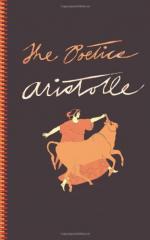
|
| Name: _________________________ | Period: ___________________ |
This test consists of 15 multiple choice questions and 5 short answer questions.
Multiple Choice Questions
1. Aristotle says what type of poetry imitates the "lower" types of men?
(a) Tragedy.
(b) Comedy.
(c) Roman poetry.
(d) Greek poetry.
2. Aristotle explains that the medium specific to poetry is one that uses what?
(a) Pictures.
(b) Rhyme.
(c) Language alone.
(d) Words and pictures.
3. What type of poetry does Aristotle say focuses on serious and important actions?
(a) Tragedy.
(b) None of the answers is correct.
(c) Greek poetry.
(d) Roman poetry.
4. What two things does Aristotle require to be present in a well-written story?
(a) Conflict and pain.
(b) Birth and death.
(c) Irony and foreshadowing.
(d) Rhythm and harmony.
5. When a poet simply straightforwardly describes the events as they happen, what method does Aristotle say the poet is using?
(a) The method of third person.
(b) The method of recognition.
(c) The method of first person.
(d) The method of imitation.
6. According to Aristotle, why do good poets sometimes write stories using episodic plots?
(a) To showcase their skills in contests.
(b) Because episodic plots are considered more interesting.
(c) They never write stories using episodic plots.
(d) For the challenge.
7. How does Aristotle differentiate poetry from prose?
(a) Prose uses pictures and music.
(b) Poetry uses rhythm in the form of meter.
(c) They are the same.
(d) Poetry uses language alone.
8. How does Aristotle define "Recognition"?
(a) An understanding of something.
(b) A deep knowing.
(c) A change from ignorance to knowledge.
(d) A sudden realization that one is familiar with something.
9. How does Aristotle say the different types of poetry emerged?
(a) Peers voted on their preference.
(b) The most talented poets decided on the different types.
(c) From the personalities of different types of men.
(d) From non-fiction.
10. Into what two types does Aristotle divide actions?
(a) Good and bad.
(b) Happy and sad.
(c) Congruent and incongruent.
(d) Simple and complex.
11. What does Aristotle identify as the foundation of good poetry writing?
(a) Probability and necessity.
(b) Irony.
(c) An interesting twist or turn.
(d) Using well-researched historical events.
12. In the context of poetry, Aristotle explains that rhythm is used in the form of a what?
(a) Specific beat.
(b) Meter.
(c) Mysterious undertone.
(d) Harmony.
13. Aristotle defines poetic work as what?
(a) A bad imitation.
(b) A spiritual journey.
(c) A love affair.
(d) A philosophical undertaking.
14. Aristotle states that poetry depicts what?
(a) The future.
(b) Things that happen according to the "laws of probability and necessity."
(c) History.
(d) Things that happen based on fact and fiction.
15. In poetry, Aristotle says that in the "Odyssey" recognition comes about how??
(a) Penelope recognizes his walk.
(b) The suitors recognize him by his face.
(c) Odyssues's nurse recognizes him from his scar.
(d) None of the answers is correct..
Short Answer Questions
1. Aristotle says that storytelling with episodic plots is to be favored by whom?
2. What is history according to Aristotle?
3. A character attempting to save his friend but accidentally killing him instead is an example Aristotle gives for what?
4. In art, Aristotle defines the medium as what?
5. In how many ways does Aristotle say the method of imitation can differ?
|
This section contains 513 words (approx. 2 pages at 300 words per page) |

|




